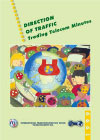
Summary
|
7. Profits and Losses
When the first Direction of Traffic report was published, five years ago, international telecommunications was a high margin, high growth market. But the business of carrying international telephone traffic is no longer such a profitable one to be in. New market entry and price competition are turning the provision of minutes of international traffic into a cut-throat commodity business. The Internet threatens to undermine the entire business model on which the international traffic industry is founded. As Table 4 shows, while the top 20 public telecom-munication operators (ranked in terms of international traffic) saw their traffic streams grow by 7 per cent during 1998, the revenue they derived from the service actually fell by some 8 per cent. This reflects the impact of tariff cuts which many operators made before and during 1998 in order to combat the threat of competition. Also international traffic is increasingly being routed outside the accounting rate system in ways which are not as easy to measure, for instance, via the Internet. The prospects of slower growth have encouraged the major carriers to seek alliances to achieve economies of scale and further scope for cost-cutting, notably the AT&T/BT alliance and the MCI/WorldCom merger.
Whichever scenario comes to pass for the evolution of the international trading system for minutes of international
telecommunications traffic, it is likely that the current volume of cross-border financial transactions, particularly from developed to developing countries, will diminish in size and significance. In the days of relative plenty, it was possible for carriers to overlook
the inequities and inefficiencies of the accounting rate system. Now that profit margins are being squeezed, above-cost accounting rates seem an obvious target for cost-cutting. The main losers from settlement payment reductions are likely to be operators in
developing countries. They face a dilemma. If they cut settlement rates too quickly, they may lose vital revenue. On the other hand, if they cut settlement rates too slowly, they risk seeing the whole accounting rate system collapse with voice traffic shifting to the Internet. The majority of developing countries are now negotiating lower settlement rates, but they argue that more time is needed before they can reach cost-oriented levels. The critical word is transition.
The bottom line is that change is inevitable, but for developing country carriers that change should be approached positively. There are risks on both sides, but the status quo is not an option. With the recommendations of the ITU Focus Group, a consensus transition path has now been mapped out. But will it be followed? |
The Internet threatens to undermine the entire business model on which the international traffic industry is founded |



